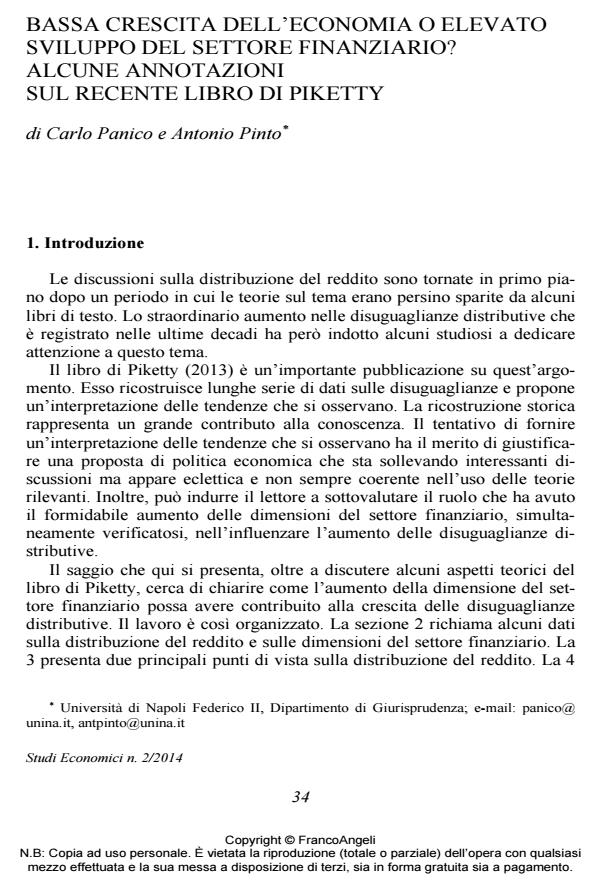Bassa crescita dell’economia o elevato sviluppo del settore finanziario? Alcune annotazioni sul recente libro di Piketty
Journal title STUDI ECONOMICI
Author/s Carlo Panico, Antonio Pinto
Publishing Year 2015 Issue 2014/113 Language Italian
Pages 27 P. 34-60 File size 180 KB
DOI 10.3280/STE2014-113002
DOI is like a bar code for intellectual property: to have more infomation
click here
Below, you can see the article first page
If you want to buy this article in PDF format, you can do it, following the instructions to buy download credits

FrancoAngeli is member of Publishers International Linking Association, Inc (PILA), a not-for-profit association which run the CrossRef service enabling links to and from online scholarly content.
The paper deals with the role of the expansion of the financial sector in the recent increase in income inequality. It first considers the positions presented by Piketty in his recent book on this theme, criticising his neglect of role of the financial sector and his view that the low growth of the economy is inevitably and is not related to the changes in income distribution. Then it presents some analyses to show that the size of the financial sector affects the distribution of income between social groups. By using these analyses, the paper proposes an interpretation of the role of the financial industry in the recent changes in income inequality and in the burst of the recent financial crisis.
Keywords: Income distribution, inequality, financial sector
Jel codes: E25
- Barba A., Pivetti M. (2009), Rising household debt: its causes and macroeconomic implications – a long-period analysis, Cambridge Journal of Economics, 33 (1): 113-37.
- Dumenil G., Levy D. (2004), The real and financial components of profitability (USA 1948-2000), Review of Radical Political Economy, 36: 82-110.
- Fetter F.W. (1965), Development of the British Monetary Orthodoxy, Cambridge: Harvard University Press.
- Krugman P. (2007), The Conscience of a Liberal, New York: Norton and Co.
- Marx K. (1894), Das Kapital: KritiK der Politischen Oekonomie, Buch III, Herausgegeben von Friedrich Engels, Hamburg: Verlag von Otto Meissner.
- Traduzione italiana: Torino: Einaudi, 1977. Palley T.I. (2007), Financialization: what it is and why it matters, The Levy Economic Institute of Bard College Working Paper, n. 525.
- Palma J.G. (2009), The revenge of the market on the rentiers: why neo-liberal reports of the end of history turned out to be premature, Cambridge Journal of Economics, Special Issue on the Global Financial Crisis, 33 (4): 829-66.
- Panico C. (1988a), Interest and Profit in the Theories of Value and Distribution, London: Macmillan and New York: St. Martin Press.
- Panico C. (1988b), Sraffa on money and banking, Cambridge Journal of Economics, 12 (1): 7-28.
- Panico C. (2001), Monetary analysis in Sraffa’s writings, in Cozzi T. and Marchionatti R. (Eds.), Piero Sraffa’s Political Economy: a Centenary Estimate, London: Routledge, 285-310.
- Panico C., Pinto A., Puchet Anyul M. (2012), Income distribution and the size of the financial sector: a Sraffian analysis, Cambridge Journal of Economics, 36 (6): 1455-77.
- Panico C., Pinto A., Puchet Anyul M., Suarez Vazquez M. (2013), The evolution of financial regulation before and after the crisis, Economica, 15 (1): 9-40.
- Piketty T., Saez E. (2003), Income inequality in the United States, 1913-1998, Quarterly Journal of Economics, 118 (1): 1-39.
- Piketty T., Saez E. (2006), The evolution of top incomes: a historical and international perspective, American Economic Review. Papers and Proceedings, 96: 200-05.
- Piketty T. (2013), Le capital au XXI Siècle, Paris: Editions du Seuil. Traduzione italiana: Milano: Bompiani, 2014.
- Samuelson P.A. (1966), A summing up, Quarterly Journal of Economics, 80 (4): 568-83.
- Sraffa P. (1922), The bank crisis in Italy, Economic Journal, XXXII (126): 178-97.
Carlo Panico, Antonio Pinto, Bassa crescita dell’economia o elevato sviluppo del settore finanziario? Alcune annotazioni sul recente libro di Piketty in "STUDI ECONOMICI " 113/2014, pp 34-60, DOI: 10.3280/STE2014-113002